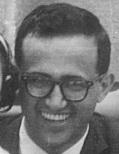 Professor Antonio Calabria died at his home in San Antonio, Texas, in early October 2018.
Professor Antonio Calabria died at his home in San Antonio, Texas, in early October 2018.
Antonio Vittorio Calabria was born in Asmara, Eritrea, on July 17, 1941. His parents, originally from Sicily, had been settled there under Mussolini. During the war, his father was captured by the British in Egypt. Antonio’s first memories included his mother’s and his evacuation by the Red Cross, which carried them on a ship with other refugees around the Cape of Good Hope, back to Italy. There they were confined in a camp for displaced persons in the North before making their way back to Messina, where they were joined by Antonio’s father shortly after the war. In 1953, Antonio and his mother migrated to Providence, Rhode Island, to join his father, who had crossed over before them in search of work.
Calabria earned a scholarship to study at Brown University, where, under the influence of William F. Church, a leading scholar of French absolutism, his interests turned to historical studies. After a Fulbright year in France, Calabria went on to the University of California, Berkeley, where he studied with Gene Brucker. He received his doctorate in 1978, then joined the faculty of history at the University of Texas at San Antonio in 1980. He served there until his retirement in 2012.
A specialist in early modern European history, Calabria played a significant role in bringing attention to the history of southern Italy in the 16th and 17th centuries, at a time when the field was dominated by a focus on Florence, Venice, and Rome.
His book The Cost of Empire: The Finances of the Kingdom of Naples in the Time of Spanish Rule (1991)—winner of the AHA’s Helen and Howard R. Marraro Prize—offered a close study of the ways in which Spain exploited Neapolitan resources in the late 16th and early 17th centuries. Mustering evidence from the State Archives in Naples as well as those of the Spanish crown in Simancas, Spain, Calabria demonstrated that Naples in this era was largely the victim of a Habsburg imperial system that essentially sucked the lifeblood out of the Neapolitan economy in order to support its military undertakings in Lombardy and Germany. The Cost of Empire proved to be a major contribution to the literature of the crisis of the 17th century.
Also important on this front was “Good Government” in Spanish Naples (1990), a volume of essays Calabria co-edited with John A. Marino. What made this publication especially important was its politics of translation. Calabria and Marino presented several of the leading historians of early modern Italy in English for the first time, with the goal of disrupting the traditional Anglo-American assumptions about the centrality of Florence or the Renaissance for our understanding of early modern Italy. “Our knowledge of the Italian Renaissance,” the editors wrote, “should not be skewed by the cultural imperialism of Florentine and Venetian Studies, by an Anglo-American historiography mesmerized by an idealized republican liberty and innovative merchant capitalism, by the military and diplomatic emergences spawned by the French invasions, or by the derogatory incantation of ‘decadence’ maligning foreign rule.”
Despite his focus on economic history in his research, Calabria was committed in his teaching to introducing students to intellectual and cultural history. He gave particular emphasis at the undergraduate level to teaching largely canonical primary sources, from St. Augustine’s Confessions to Machiavelli’s The Prince. An entertaining lecturer, he brought many of the authors he taught to life through his intimate knowledge of their worlds. At the graduate level, he focused on many of the major historiographical texts of the 20th century, especially those by Marc Bloch and Fernand Braudel. He was rigorous in his expectations but greatly enjoyed his students and their interests in the broad themes he covered in his classes.
Calabria did much to foster connections between US and Italian scholars, several of whom visited him in San Antonio. In his home—chock-full of books—he enjoyed the company of a favorite cat or dog. His friends recall his irreverent sense of humor, his enthusiasm for the latest book, and his love for economy and precision in language.
John Jeffries Martin
Duke University
Tags: In Memoriam Europe Economic History

This work is licensed under a Creative Commons Attribution-NonCommercial-NoDerivatives 4.0 International License. Attribution must provide author name, article title, Perspectives on History, date of publication, and a link to this page. This license applies only to the article, not to text or images used here by permission.
The American Historical Association welcomes comments in the discussion area below, at AHA Communities, and in letters to the editor. Please read our commenting and letters policy before submitting.
Comment
Please read our commenting and letters policy before submitting.






